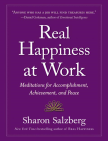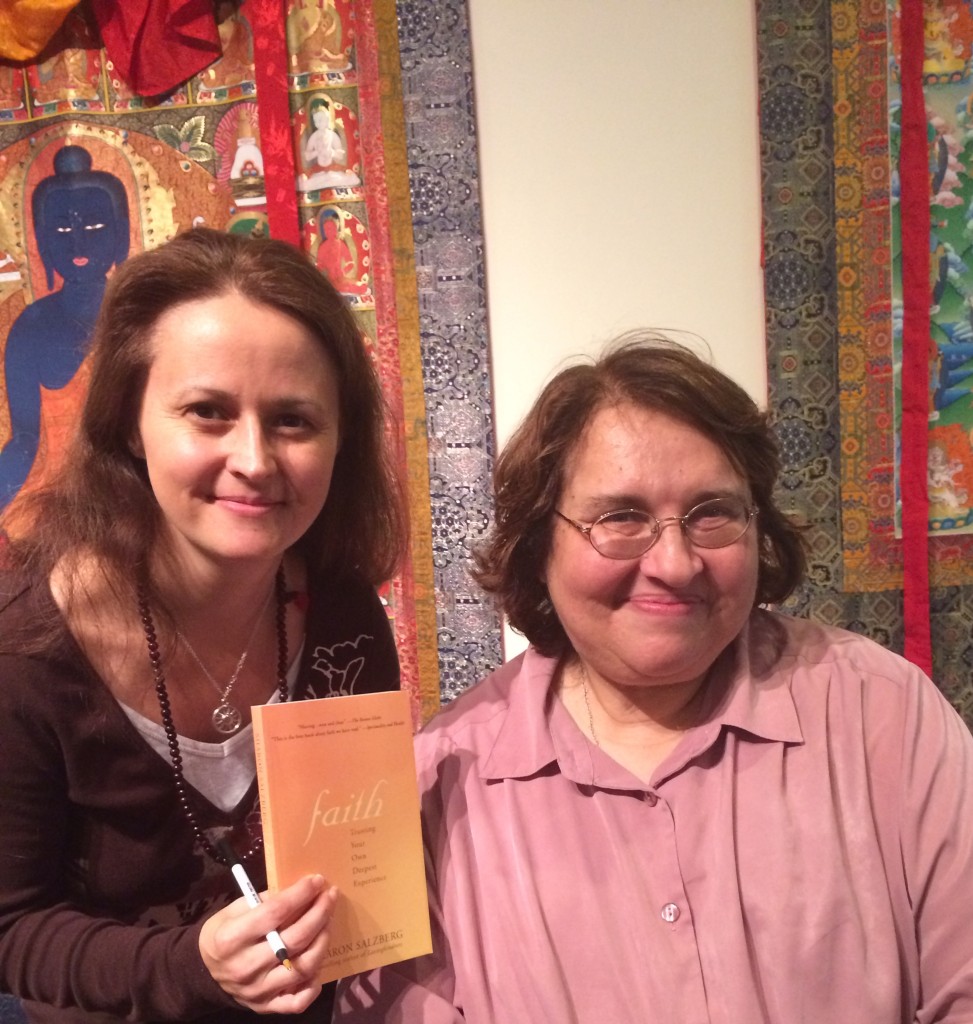Walking through the mountains, we heard the entrancing melodies of kirtan sung by Krishna Das and friends echoing intensely over the sound of our footsteps on the gravel trails. We were at Menla mountain retreat for the Power of a Loving Heart seminar. Menla is a special spiritual place, located in the Catskill Mountains of New York and affiliated with Tibet House. The land had been donated for the purpose of such retreats and has been deemed by many, including the Dalai Lama, during one of his stays, as having great spiritual power.
 Such a peaceful and inspiring setting may seem far removed from a day at the office, but such retreats can actually offer insight into what is truly important to us and how to integrate these values into the work setting. Reflecting in this way can help yield greater job satisfaction. After all, we spend copious amounts of time at work, and aligning the work itself as well as our thoughts about the work with our deeply-held values serves to bring a sense of purpose and even joy to what we do. Otherwise, we risk burnout and boredom. Even if we are already experiencing such feelings of being overwhelmed, uninterested, or disconnected when it comes to our jobs, reevaluating how we approach the very idea of work can help us shift into a space of fulfillment.
Such a peaceful and inspiring setting may seem far removed from a day at the office, but such retreats can actually offer insight into what is truly important to us and how to integrate these values into the work setting. Reflecting in this way can help yield greater job satisfaction. After all, we spend copious amounts of time at work, and aligning the work itself as well as our thoughts about the work with our deeply-held values serves to bring a sense of purpose and even joy to what we do. Otherwise, we risk burnout and boredom. Even if we are already experiencing such feelings of being overwhelmed, uninterested, or disconnected when it comes to our jobs, reevaluating how we approach the very idea of work can help us shift into a space of fulfillment.
[fb_button]
I had attended Krishna Das and Sharon Salzberg’s retreat before and looked forward to their outpouring of insight through storytelling, meditation, and chant. So, the anticipation of this experience brought back all sorts of warm memories of tranquility, insight, rest, and revelation. This time, over a hot cup of Chai tea, Sharon and I would chat for hours late into the night in the simple cottage. We reminisced and spoke about everything from life’s mundane, everyday, joys and hassles to coping with trauma. I was privileged to hear personal stories of some of her early experiences in India while discovering meditation. The practice of Loving- Kindness has been her life’s path.
At this time, I was most eager to hear her thoughts concerning life and aspirations related to career, in order to better understand the role of this thing we call “work.” In her new book, Real Happiness at Work, Sharon writes about her interviews with numerous people from all walks of life. In her field research, she discovered that that the common thread to job satisfaction, no matter the type of work, was having personal meaning. In fact, meaning is one of the eight pillars of satisfaction that she poses in her book.
 As the brilliant moon guided me back to my cottage, and with the gentle sounds of music still lulling my being, Sharon’s sentiment perfused deep in my heart, to yet another area, that of life’s work. I would, once again, leave the retreat inspired. I hope the following audio excerpt of our dialogue awakens, in you, a similar thirst to continue to seek an enhanced understanding of your life’s path.
As the brilliant moon guided me back to my cottage, and with the gentle sounds of music still lulling my being, Sharon’s sentiment perfused deep in my heart, to yet another area, that of life’s work. I would, once again, leave the retreat inspired. I hope the following audio excerpt of our dialogue awakens, in you, a similar thirst to continue to seek an enhanced understanding of your life’s path.
Stay tuned for upcoming excerpts from conversations with Sharon Salzberg, as well as interviews and audio of melodic kirtan by one of Krishna Das’ partnering musicians, Ambika Cooper. Make sure you are signed up for your My Mindful Way of Life newsletter to receive notifications. Click here to sign up and receive a free introductory guided meditation download.
Make sure to like us on Facebook for updates and to share with your friends!
A brief synopsis is provided below. Enjoy, and share the love on your favorite social media!
UK- Welcome, I am here with Sharon Salzberg. I am so excited to be speaking with you and take this time during a retreat. I appreciate your time and look forward to talking about compassion and meditation and what we are working on this weekend. So, thank you.
I’d love to hear a little bit about your upcoming book. I am really looking forward to that. There are so many areas that we can be putting this into work.
S: I was asked to do the book by the publisher. It was a really interesting exploration for me because I have never worked in a traditional setup. I have never had a boss. I have had a lot of freedom in my work life. I have seen it grow and develop as the culture has changed a lot of its attitude about meditation and practice. It involved a lot of listening on my part and interviewing. I was very determined because a lot of these books about mindfulness in the workplace center are on google or the world of finance. I did interview people in the tech field but I also talked to firefighters, nurses and artists, and divorce lawyer and yoga teacher. I wanted a big, big spread of people. It was very gratifying. I distilled it down to the 8 pillars of what I thought really brings happiness in the workplace. I start with balance, which is really mindfulness, concentration, compassion, resilience, communication, integrity, meaning and open awareness.
UK-That personal meaning
S- Not everybody works in a job that society will deem meaningful. I really feel that we can find meaning. I feel like I’ve been given the gift of a different day because of a sales clerk or a cab driver. I have many stories of cab drivers. Trust in personal connection and having a sense of personal mission in bringing happiness one can find meaning.
UK– That comes back to interconnection. What would we do without the cab drivers, or the waitresses as we sit there demanding our lunch. I had an interesting experience one time related to an assumption I didn’t realize I had. It was around the 9-5 work day. It was about some event and I was thinking that’s silly, who could get there at that time. My friend responded, well, all the people that work nights so that you can go to movies and out to eat. I realized I do appreciate that and need to appreciate it in a different way.
S– When I first met with the editor she asked what I wanted the chapters to be about. I said, burnout, and lack of meaning, and loss of integrity. She said, couldn’t you be more positive. (Ha Ha).
UK– Well, we are problem solvers. It’s where our mind first goes to. The people you spoke to knew you were writing the book. Are they meditating?
S- They were meditating. Every February I run a 28 day meditation challenge on my website and they were blogging about their experience. So, that was a huge source of material. We turned to them and said, let’s talk about your work-life. Then there were other people, like perhaps a friend, who was not meditating and we asked them about issues such as communication.
S- There are three basic three styles of meditation, one emphasizing mindfulness, one emphasizing concentration, and one emphasizing loving-kindness. Then, there are other meditations that build on that. There are other things that are not necessarily meditations. Such as, in one column write down all the things that are giving you difficulty at work. Then, in the other column write down what you are doing to manage your stress. Then, look at the second column and assess, just evaluate, is all that drinking really helping change things. There are a lot of reflections. One of my favorite things is called stealth meditation. For example, if you are walking to work, or the last part of the commute just do it: don’t text just walk. Just walk. Or, if you are writing what seems like it’s going to be a difficult communication, send the email to yourself first to see what it’s like to be the recipient.
UK-I love that you pair that side by side in the columns and you ask them to look at it. As we start looking at stress at work or in other situations. It is very easy to look at the external. But, you flip it back to what are you doing to alleviate stress. Wait me? What am I doing? That is nice.
S- Balance, which is really mindfulness, concentration, compassion, resilience, communication, integrity, meaning and open awareness.
UK- There’s a book I read “Your mind at work.” It’s making use of your mind. In this driven society, where there is pressure on doing more and more in less time, being more efficient, that piece can be so important. It gives a nice synopsis of a woman’s day as she comes into the office all the way from her mind in the car. It’s so easy to just fill every moment by checking emails, but that depletes certain areas of your brain. Then it doesn’t function as well for those larger projects when you have been engaging in those multitasking tasks. That speaks to the fatigue.
It sure seems that the mindfulness practice and the importance of mindfulness. That’s why they have had to have all these laws about texting in the car. We are trying to be efficient in our time! Thank you Sharon.
 For further information on Real Happiness at Work, including, excerpts, and to follow Sharon Salzberg check out SharonSalzberg.com
For further information on Real Happiness at Work, including, excerpts, and to follow Sharon Salzberg check out SharonSalzberg.com


Pingback: Get Inspired- Real Happiness Audio Interview With Sharon Salzberg - Sharon Salzberg